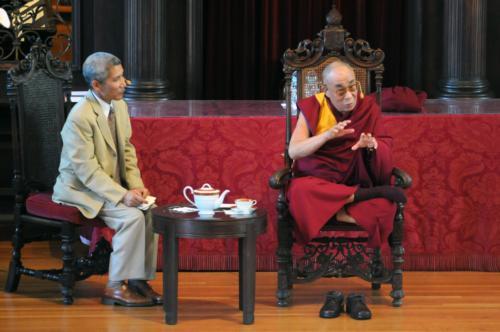
News
Summers Will Not Finish Semester of Teaching as Harvard Investigates Epstein Ties

News
Harvard College Students Report Favoring Divestment from Israel in HUA Survey

News
‘He Should Resign’: Harvard Undergrads Take Hard Line Against Summers Over Epstein Scandal

News
Harvard To Launch New Investigation Into Epstein’s Ties to Summers, Other University Affiliates

News
Harvard Students To Vote on Divestment From Israel in Inaugural HUA Election Survey
Dalai Lama Urges Unity
Tibet’s spiritual leader delivers message of 'love, compassion'

One must not only “educate the mind, but also the heart,” the Dalai Lama said yesterday morning to a rapt audience at Memorial Church in a speech entitled, “Educating the Heart.”
The Divinity School and the Graduate School of Education co-hosted the 14th Dalai Lama Tenzin Gyatso, the spiritual leader of Tibet. After traditional Tibetan dance performances and introductory remarks by Divinity School Dean William A. Graham and School of Education Dean Kathleen McCartney, audience members stood in anticipation as the Dalai Lama entered the hall and proceeded on stage.
The Dalai Lama lightened the mood when he began by saying that “the first task is to remove the shoe,” and doing so with a chuckle. He sat cross-legged on the wooden throne, which was specially constructed for the event by local Tibetans.
He spoke casually and conversationally to the audience, giving the speech an “intimate feeling,” in the words of Cristina Y. Remond, a first-year student at the Divinity School.
Despite his light-hearted and easy-going demeanor, the Dalai Lama’s message was a serious—and uniting—one.
“Mentally, emotionally, physically we are the same,” the Dalai Lama said. “Therefore on that level we can communicate easily.”
He emphasized infusing education with compassion. “The brain alone will not bring joyfulness or happiness,” the Dalai Lama said, adding that “one must practice love, compassion.”
Compassion is common to all religions, he said, stressing interfaith understanding.
School of Education spokeswoman Amy Rollins said that the Dalai Lama’s message exemplified the school’s mission statement, “to generate knowledge to improve the life of all learners.”
“He frames education as a life goal instead of something that happens for 12 years in school,” she said.
Audience members expressed enthusiasm for the Dalai Lama’s ideas.
Allyson R. Lent, a first-year student at the Divinity School studying to be ordained in a Unitarian Universalist church, said she wants to spread the Dalai Lama’s message about compassion to her own communities.
Daniel M. Dion, a student in his final year studying Catholic theology, said, “I care about inter-religious dialogue, and it’s important to have the possibility of dialogue, especially in my faith.”
The Dalai Lama wanted to hear from the students and faculty, according to Rollins, and he took questions from the audience after his speech.
When asked whether he has ever doubted his faith, the Dalai Lama replied with a quick “No,” eliciting laughter from the audience.
Following the talk, the Dalai Lama proceeded outside for a tree-planting ceremony, where he planted a special hybrid birch tree, created from Eastern and Western birch tree strains by Harvard’s Arnold Arboretum. University President Drew G. Faust also presented him with a commemorative picture to honor his visit.
“It’s interesting to see him in a Western setting, and not his native setting,” said Neethi A. Venkateswaran, a Divinity School student in her final year of study.
“You can interact with the Dalai Lama in many ways,” said Remond. “You can go into it with thoughts and expectations, or go in completely open, listen with your heart, and allow yourself to be transformed.”
—Staff writer Emma R. Carron can be reached at ecarron@fas.harvard.edu.
—Staff writer Melody Y. Hu can be reached at melodyhu@fas.harvard.edu.
Want to keep up with breaking news? Subscribe to our email newsletter.
